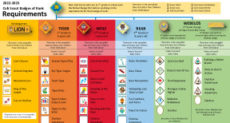In many troops, there is an ongoing battle, or maybe just a misunderstanding, about exactly who is responsible for what. Â Without getting into the line between what is an adult function and what is a youth responsibility, I’m referring to committee and program functions and how sometimes the lines get blurred.
The Troop Committee Guidebook has a great description of the duties and responsibilities of the Scoutmaster and assistants, and the Troop Committee and various committee members.  Sometimes, however, people cross out of their “lane” and handle other jobs.  An example would be a troop treasurer who also handles membership and advancement.  Not to say that this is incorrect (what works for you is good, as long as it furthers the aims and methods), and in a small troop it may be necessary, but  there are defined roles for each committee function and it should be your goal to see that each position is filled with a different adult, so nobody has to do more than one job.
It’s important to keep from overstepping our bounds as well.  Committee members don’t conduct Scoutmaster conferences, obviously, but there are other areas where the committee needs to leave things up to the Scoutmaster and his staff of assistants.  Working directly with boys, for the most part, is a Scoutmaster job.  There are, as always, exceptions – the Troop Committee Guidebook lists one of the Advancement Coordinator’s jobs as working with the  troop Scribe to maintain scout advancement records.  If something needs to be said to the boys, you would go first to the Scoutmaster, not to the boys directly (unless it’s a matter of immediate safety).
Likewise, Scoutmasters should leave committee functions to the committee, although their input is valuable and usually needed to make reasonable decisions. Â Equipment, budget, camp arrangements, record keeping – these are all committee functions. Â The Scoutmaster can also sit on the troop committee in an advisory role but is not a committee member.
Cooperation is the key to a successful troop, and if everyone “stays in their lane” the troop will run more efficiently and provide a better experience for the boys.
This post first appeared on Bobwhite Blather.




Here’s a corporate example (cnn.com) from Fortune Magazine of how straying from your lane, or overlapping responsibilities, can lead to your downfall, and what can be done to recover from it. In the article, the new chairman of GM talks about “swim lanes” with reference to how GM’s brand lines were regularly blurred in the past. Yes, they have fewer brands now, but each one has been charged with being different from the others.